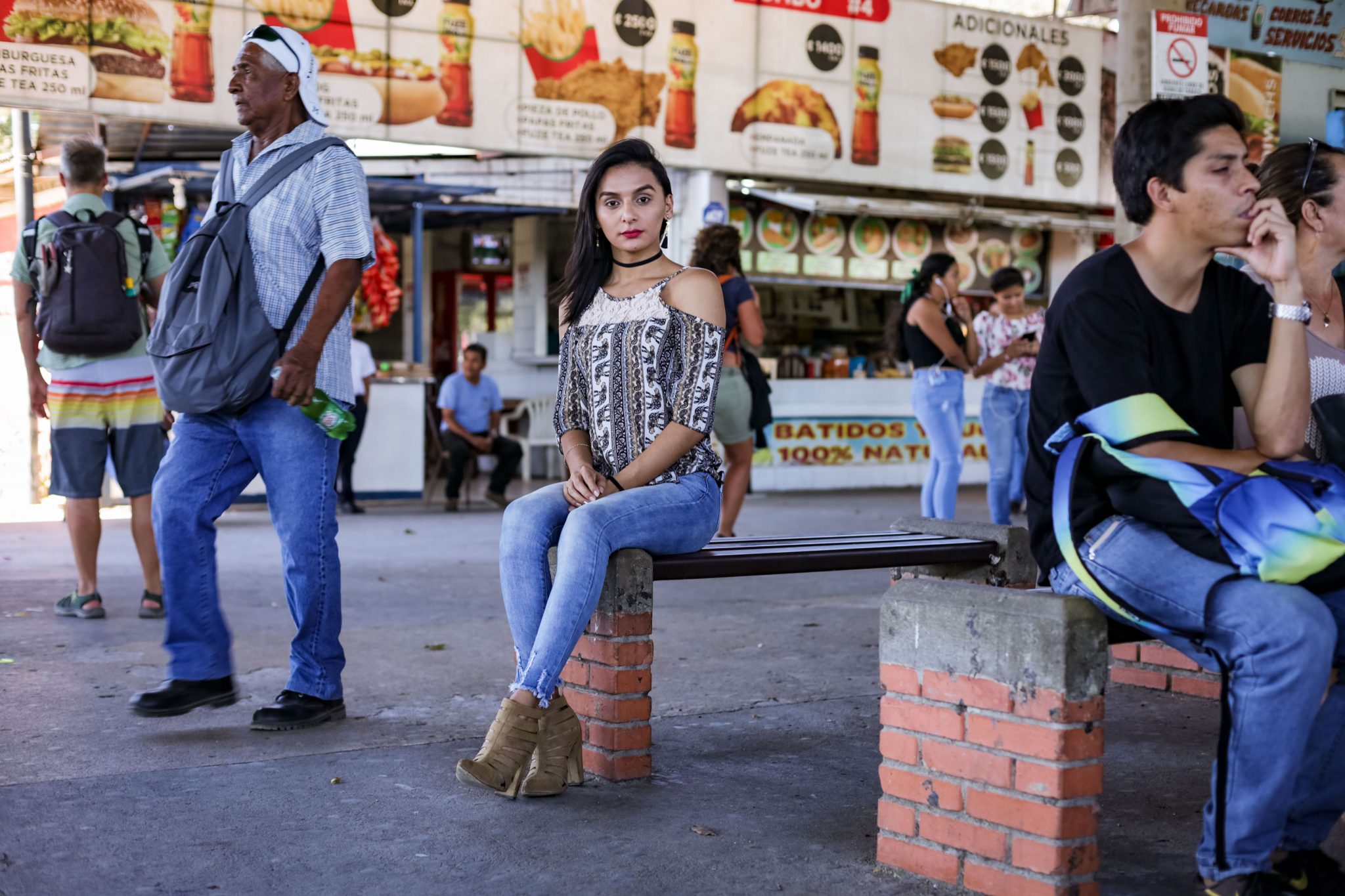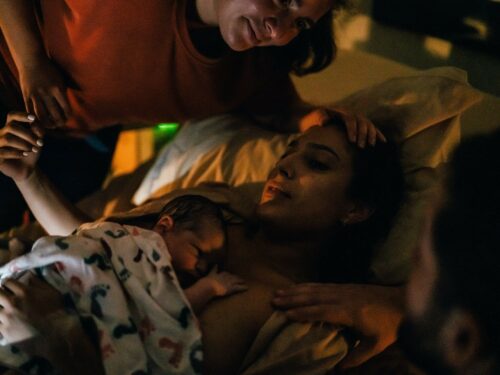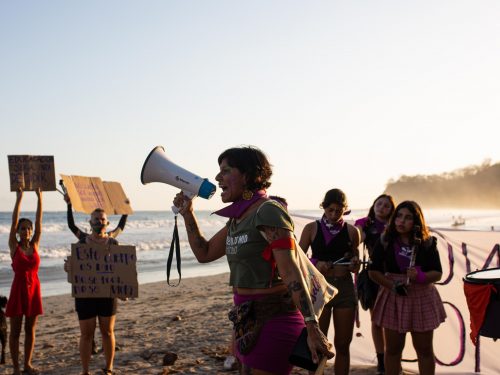
It was Christmas in 2018 in Quebrada Grande, Liberia, a day for gifts. Miss Maricel got up and said, “I have a gift for my daughter.” She paused, turned to the thin girl with long, black hair and glistening eyes and said, “for my daughter Kenya.” The room went silent. They thought the gift was for her other daughter.
It was the first time that her family called her Kenya, her real name and the one that truly identifies her. For them, she had always been Kenneth Gerardo.
Kenya is a transgender woman. She identifies as a woman even though her sexual organs are masculine. Two years ago, in 2017, she started her transition to womanhood.
The American Medical Association (AMA) said in 2018 that it’s essential to recognize that the gender identity of a person may not be aligned with their sex at birth.
I saw a report about this actress Caitlyn Jenner and I said, ‘what does it mean to be trans?,” Kenya tells me while sitting in a cafe in Liberia.
“So I researched it and I saw that her feelings were similar to mine. It took me a while to accept that I was a transgender girl for fear.
That Christmas, her grandparents and father – especially her father – didn’t know what to do. Their looks crossed each other and they wondered if the other understood what was happening.
The state had just recognized the right. In May 2018, seven months before Christmas at Kenya’s house, the Supreme Elections Court (TSE) approved changing names on IDs so that people could correct their name according to their gender identity.
The institution also announced the elimination of the sex box on the document, though in their database people will still be registered with an F or M according to their birth sex.
According to TSE data, the institution has received 387 name change requests due to gender identity since then nationwide, 14 of them in Guanacaste. Ten correspond to transgender women and fourt to transgender men.
The institution abided by the ruling from the Inter-American Human Rights Court (CIDH) after a request filed by the government of former President Luis Guillermo Solís in May 2016.
Sources interviewed for this story said that the TSE’s decision is, until now, the greatest advance in recognizing gender identity and transgenders in the country.
But not everyone celebrates it. Lawmakers from the Social Christian Unity Party and the National Restoration Party strongly criticized the court’s decision. In the case of the Christians, they warned in a press release that the TSE’s position “threatens the biological figures of man and woman and could lead to a relative nature…”
Social Christian Lawmaker Dragos Dolanescu said that his opposition to some of the rights recently recognized by the CIDH in Costa Rica is due to his religions position.
We are against gay marriage because of religion. For us, it’s a sacrament and being in favor of it harms the Christian community,” he said.
But Kenya doesn’t care much for those opinions. She cares more about the final result. In her case, the name change took two months. Requesting it was easy for her and getting rid of the “known as” on her ID was a relief.
She says that a while ago she bought a fan in a store where her name already appeared as Kenya. She didn’t know that the name change was included in different systems. “That satisfied me,” she says. “I think they will discriminate against us less because we have support saying that we should be addressed as women.”
What is true is that, even with the name change on the ID, the transgender population isn’t done fighting. In Congress, for example, the debate about rights for LGBTI (lesbains, gays, bisexual, transgenders and intersex) continues.
Congressman Enrique Sánchez of the Citizens’ Action Party (PAC) and head of the Human Rights Committee in Congress pointed out two bills in which some lawmakers are against including the concept of sexual identity, annulling the possibility of including diverse populations in the rights that are granted through these new regulations. One of them is the comprehensive reform to the HIV law and the other is the Anti-Discrimination Law.

It’s 9 a.m. at the city bus stop in Liberia. “I go in to these places and I always think, why are people staring at me? Am I ugly? Am I weird? Am I good looking? That lasts for a while and then I say, they saw me. Let’s continue,” says Kenya Ariadna Castillo Vargas, 22.
Surviving
Vanessa Centeno is a 41-year-old transgender girl who calls herself the “first transgender girl in Guanacaste.” For her, the name change is an important step but doesn’t go far enough to forget her past, but will help the population feel less marked by society.
I requested it because I was interested in feeling good about myself, because that’s the person I should have been recognized as years ago,” she says as she sits in the Liberia park, fanning herself.
The chauvinist Guanacaste, as she calls it, forced her to leave the province just after turning 10. She says her father beat her with a belt and he thought that he was going to turn her into a man.
“It didn’t work because here I am as a woman,” she says with a laugh and a deep bdeeath.
She moved to San Jose and ended up trapped in sex work for 20 years. During that time she lived through the worst experience of her life. But it wasn’t the only one.
She was raped by four men that gagged her and left her under the Anonos bridge in Escazu. “That’s how society is. Transphobic.”
The CIDH agreed with Vanessa in a 2015 press release.
This organization found a direct link between exclusion, discrimination and the short life expectancy of transgender people. On average they live to 35 in Latin America.
“According to information received by CIDH, violence and discrimination against boys, girls and young transgenders starts at an early age and they are generally kicked out of their homes, high schools, families and communities as a consequence of expressing their gender identities,” the communique says. “As a result, transgender persons face poverty, social exclusion and high rates of inaccessibility to housing, pressuring them to work in informal economies that are highly criminalized, such as sex work,” the document says.
The presidential commissioner for LGBTI matters Luis Salazar says that the name change due to gender identity contributes to breaking the conditions described by the CIDH.
“When there was no agreement between a person’s identity and the ID document, usually that’s where cases of discrimination happened and they were rejected from services and attention,” Salazar says.
Vanessa is two exams away from completing her bachelor’s degree and she helps a friend sell clothes in order to stay off the street. She’s waiting for her new ID and to “continue surviving.”

Bárbara Fajardo Soto is 27, but she tells everyone she is 25. In 2017 she became the first Gay Miss Guanacaste in the history of the province. She has a boyfriend, Christopher. She dreams of getting married and she wants to be a beauty stylist. The day she receives her ID with her female name she will have a commemorative funeral for who she used to be.
Achievement by Achievement
Bárbara Fajardo is the most optimistic of the three Guanacastecan transgender women we interviewed. You could say that optimism keeps her alive.
If a girl wants help, seek me out. If a girl wants to study, I tell her to study. We came into this world with the desire to be happy. Who wants to come and be a prostitute?” she says as she puts her sunglasses on and checks her long, black, straight hair.
She says that the TSE already approved her name change and, finally, she can leave her past behind.
Bárbara is the delegate for the first headquarters of the Guanacaste Transvida Organization. According to Tilarán native, that is a “very important support that the transgender population will have in the province” in order to guide them in transition processes and name change requests.
Access to information and training transgender women on their rights was one of the limits pointed out by those interviewed for this story.
Transgender women in the province receive benefits from INA that give scholarships for some sources. They are also part of the Transvida program “from the streets to the classroom” supported by the Public Education Ministry, which seeks to open up new opportunities for this population.
Salazar remembers that the signing of four other decrees and regulations after the TSE announcement seek to guarantee that the transgender and LGBTI community has equal rights. In those documents, for example, is name changes due to gender identity, photos, and gender in another series of identification documents (passports, licenses, work contracts, education ministry certificates, degrees from public and private universities.)
The commissioner doesn’t ignore the challenges that still exist. The lack of data about the transgender and LGBTI communities in the country and the need for legislation in Costa Rica that defines hate crimes are some of them.
For the moment, Kenya will try to find a way to study sociology and create an organization to help young transgenders. Vanessa will continue looking for the best job and Barbara will work on opening her own business.
The new ID makes them think they are closer than before to achieving it.







Comments